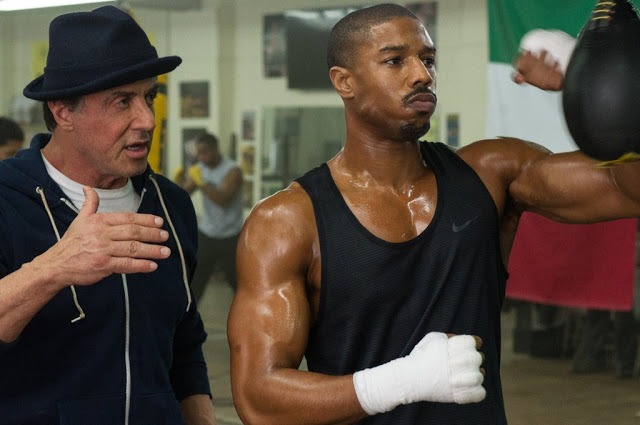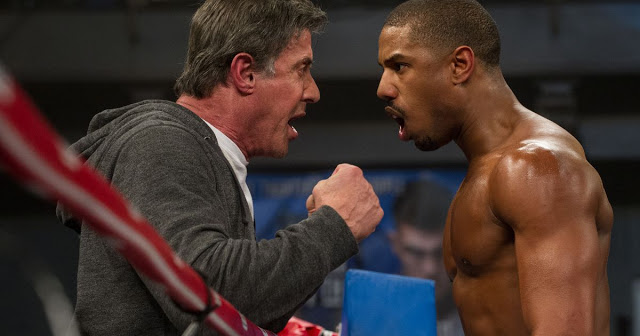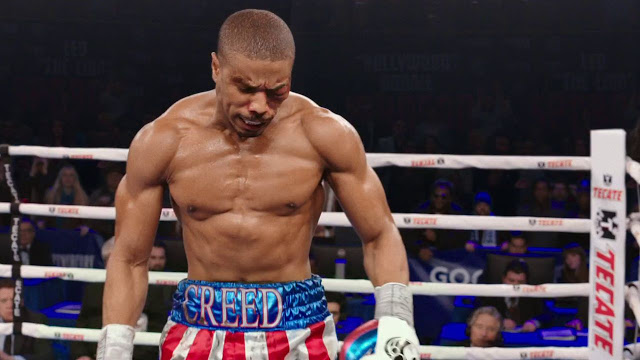The main character of Creed is an aspiring boxer striving to make a name for himself, and to evade the giant shadow cast by his father, a former legend of the sport. And Creed itself is on a similar mission. This movie, which was directed by Ryan Coogler from a script he co-wrote with Aaron Covington, is the sequel to Rocky, the winner of the Oscar for Best Picture in 1976 and one of the most beloved sports films of all time. (Technically, it’s the sixth such sequel, but let’s forget about those intervening installments for the moment.) That fact poses a monumental challenge for Creed: It must pay tribute to its predecessor while also standing as its own, fully realized creation. That it passes the first test is no great feat; as soon as Sylvester Stallone eases into the frame, shoulders sagging from the weight of playing the American icon that defined his career, the film instantly connects with its cinematic ancestor. What is more surprising—and more satisfying—is how Creed establishes itself as an enjoyable boxing movie in its own right. It doesn’t break much new ground, but it doesn’t need to. Like its hero, it relies on a combination of agility and determination to deliver a rousing experience that is simultaneously comforting and exhilarating.
As its title suggests, Creed is not primarily about Stallone’s Rocky Balboa, the Italian-American prizefighter who captured the hearts of Philadelphia (and the rest of the country) 39 years ago. Its protagonist is instead Donnie Johnson, played by Michael B. Jordan, the former television actor from The Wire and Friday Night Lights who finally broke out two years ago in Coogler’s earnest drama, Fruitvale Station. Donnie is a bright young man who works a desk job at an unspecified Los Angeles corporation, where he has just earned a promotion. Despite his relative success, his heart isn’t in finance, and he moonlights as a boxer in Tijuana, where he routinely pummels opponents at seedy underground rings. That’s where we first meet Donnie as an adult (the film begins with a quick prologue that illustrates his penchant for roughhousing as a child), the camera approaching him cautiously from behind, observing the muscles rippling down his back as he psychs himself up before delivering a brisk, savage beatdown of an unworthy foe. As soon as Donnie lands the knockout blow, he starts to remove his gloves before the fight is even called, a silent indicator of both his talent and his arrogance.
Of course, Donnie’s ability isn’t preternatural—it’s in his blood. His proper name is Adonis, and he is the son of Apollo Creed, the former heavyweight champion of the world who served as Rocky’s nemesis for the first two films in the franchise, became his loyal friend and trainer for the third, and ultimately succumbed to Dolph Lundgren in the fourth. (Apollo’s death is most memorable for Lundgren’s pitiless, meme-generating one-liner, “If he dies, he dies.”) Donnie doesn’t advertise his lineage, but he nevertheless feels drawn to the dangerous realm of boxing, where he desires to prove his own bona fides as distinct from his father’s. And so, he quits his cushy job and leaves L.A. for Philly, where he wanders into an Italian restaurant called “Adrian’s” and asks to speak with the owner, an aging, muscular fellow who used to box a time or two himself way back when.
What transpires is both predictable and pleasurable. Donnie coaxes Rocky out of retirement and into serving as his trainer, a development that raises the eyebrows of those in the close-knit boxing community who wonder why the Italian Stallion is ending his self-imposed exile to help an anonymous youth. Donnie and Rocky line up a bout against another cocky young fighter, Leo “The Lion” Sporino (Gabe Rosado), which draws the attention of British boxer “Pretty” Ricky Conlan (real-life pugilist Tony Bellew) and his opportunistic trainer (Outlander‘s Graham McTavish). The Brits see Donnie as little more than a cash cow, and they’re eager to exploit his father’s legacy to fatten the purse for a fight whose outcome is all but predestined. But Donnie has his own ideas about his destiny.
If this story sounds familiar—the underdog eager to prove himself against all odds, the old veteran wooed back into the ring for one last bout—that’s the point. Virtually all boxing movies hew to a certain formula, and while Creed dodges convention here and there, it is more notable for the inspiring manner in which it adheres to the standard script. In particular—and if you’ll pardon the inevitable metaphor—the movie delivers a ferocious one-two combination at its rough midpoint. Just before Donnie’s first fight, the referee walks into the locker room and delivers some interestingly detailed information about the federation’s rules. He’s talking fast, but the camera is focused on Donnie, who is only half-listening, instead clearly contemplating the gravity of the moment that has finally arrived. Coogler’s tight focus builds tension that you could cut with a sharp jab, which is exactly what happens; just before he’s due to enter the arena, Donnie leaps up and insists that Rocky cut his gloves off: “I’m freaking out, I gotta take a shit!” It’s a funny, wholly surprising moment that adds a welcome bit of levity and spontaneity to the proceedings.
But that’s just the taster. The actual duel between Donnie and Sporino is—and I say this with full knowledge of Creed‘s cinematic forebears—the most amazing fight scene I’ve ever seen. It’s filmed entirely in one take, with the camera constantly swooping in and out of peril, bringing you agonizingly close to the combatants’ flying fists and dripping sweat, making you cringe whenever padded glove lands on unprotected bone. Even better, the fight lasts multiple rounds; you might think Coogler would allow for a breath-gulping cut after the first bell, but he keeps the camera tight on Donnie, following him back to his corner as Rocky provides some curt, gratifyingly specific counsel, then staying with him as he returns to the center of the ring and puts those words into action. It’s an utterly riveting sequence that makes you reevaluate just how gripping boxing movies can be.
If that fight flashes Creed‘s potential for greatness, the rest of the film settles into a comfortable rhythm of non-threatening goodness that drinks deeply from the sports-movie well. There are perhaps a half-dozen training montages, each suitably vigorous, though only one—in which Donnie runs through the streets of Philadelphia surrounded by local motorcyclists—that demands a standing ovation. There are the usual appearances from celebrity talking heads, including a fake Pardon the Interruption segment with Michael Wilbon and Tony Kornheiser, as well as some authentic ringside commentary from Jim Lampley, who also played himself earlier this year in the Jake Gyllenhaal vehicle, Southpaw. (The product placement for both ESPN and HBO in this movie is healthy to say the least.) And there is, of course, the Big Fight, the culmination of a legitimately thrilling third act that will have you wincing and cheering with every hook and uppercut.
Sure, you’ve seen much of this before, but rarely done so well and with such confidence. Coogler illustrates that formulaic films can still be rewarding if they’re conceived with energy and passion, and his actors do the same. Jordan is reliably excellent; Donnie is a flatter character than he typically plays (especially when compared to his flawed tragic hero in Fruitvale Station), but he brings a visceral intensity to the boxing scenes that matches his driven persona outside of the squared circle. But the more startling contribution comes from Stallone, who portrays Rocky with a heavy world-weariness that’s surprisingly poignant. He’s finally made peace with himself, and then this kid shows up at his door and his past comes flooding back; with quiet, no-frills precision, Stallone articulates both Rocky’s excitement at getting back into boxing and his pain over all he’s lost.
Given the historical baggage it carries, it makes sense that Creed is pitched in a high emotional key, but even so, several of its subplots feel forced. Rocky’s diagnosis of lymphoma is moving (and his resigned reaction to it even more so), but Coogler ill-advisedly parallels Rocky’s battle with disease to Donnie’s fights in the ring, a ham-fisted equivalency that betrays the director’s tendency toward the cloying. Meanwhile, although Donnie’s tentative romance with Bianca (Dear White People‘s Tessa Thompson)—a burgeoning singer who suffers from hearing loss—at first feels bracingly alive, she’s eventually relegated to the role of token love interest, a waste of Thompson’s talents. And while Bellew looks the part, Ricky Conlon is a fairly bland antagonist, especially when compared to the other villains in the franchise. (Say what you want about the other Rocky sequels, but Lundgren and Mr. T make for an all-time great pair of sports baddies.)
But none of this really matters. A movie like Creed is not designed to be weighed down with overly deep characterization or excessive plotting. It’s about the pursuit of excellence, and about the pleasure in watching committed athletes hone their craft. At one point during the exhilarating climactic fight—which finally features a burst of brass on the soundtrack in the form of “Gonna Fly Now”, Bill Conti’s iconic theme from Rocky—Donnie finds himself being examined by the referee, questioning if he can continue. Despite the efforts of his cut man (Jacob “Stitch” Duran, playing himself), Donnie’s eye has swollen shut, yet when the ref asks him how many fingers he’s holding up, he answers correctly, thanks to Rocky invisibly tapping him on the back of his neck, once for each finger. It’s a subtle, clever moment, but it also provides a rush of relief. Donnie may be taking a beating, and your heart certainly cries out for his well-being, but your adrenaline has taken over. This is one fight that can’t be stopped.
Jeremy Beck is the editor-in-chief of MovieManifesto. He watches more movies and television than he probably should.



